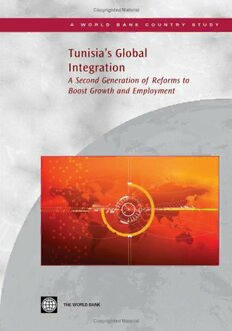
Tunisia's Global Integration: A Second Generation of Reforms to Boost Growth and Employment (World Bank Country Study) PDF
155 Pages·2008·2.51 MB·English
Most books are stored in the elastic cloud where traffic is expensive. For this reason, we have a limit on daily download.
Preview Tunisia's Global Integration: A Second Generation of Reforms to Boost Growth and Employment (World Bank Country Study)
Description:
Tunisia's past integration policies have significantly increased FDI flows in the manufacturing sector, triggering a rise of textiles and clothing and mechanical and electrical components exports through participation to EU production networks and increasing productivity, growth, and job creation. In spite of these results, important challenges remain. FDI increases are not accompanied by a rapid increase in domestic investment. The business climate of the domestic market-oriented sector can be further improved. Trade integration largely has bypassed non-tourism service sectors and the structural transformation of the service sector is slow. This study: examines the key integration challenges that the country's manufacturing sector is facing; examines the key remaining reforms needed to further enhance the competitive position of the country; and identifies the specific policy reforms needed to realize the largely untapped potential in services. The report reviews the entry, business, and trade restrictions in Tunisia's backbone service sectors (telecommunication, banking, air transport, accounting, auditing, and legal services) using a well-focused regulatory questionnaire. The restrictiveness indices derived from the regulatory diagnostic analysis allow us to assess Tunisia's relative performance. Some key regulatory reform options are proposed and their impact estimated. The study examines the prospect for further increasing exports and off shoring of a large number of services for which Tunisia has demonstrated a real export capacity.
See more
The list of books you might like
Most books are stored in the elastic cloud where traffic is expensive. For this reason, we have a limit on daily download.
